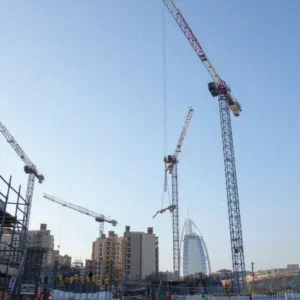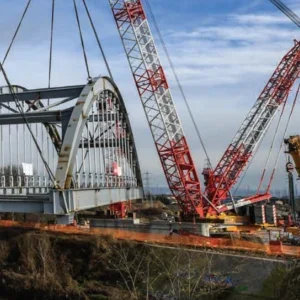Until recently, Terex ran its business in sub-Saharan Africa through a wholly-owned distributor, which focussed on mining equipment. However, a deal with local car and capital equipment specialist Imperial Holdings provided an opportunity to expand its business in the region.
Imperial’s business takes in leasing vehicles, such as hire cars and vans, to the consumer market and the distribution of capital equipment to the construction and mining industries. It bought Terex Africa from Terex on December 31, 2006. Terex Africa became part of the capital equipment side of the Imperial Holdings group, where it sits alongside a range of other business, including other construction and mining equipment distributors. The capital equipment arm of Imperial was spun off and floated on the Johannesburg Stock Exchange in May of this year, as a new business called Eqstra.
Knowing the market
Terex Africa is split up into divisions that reflect the segmentation of Terex group, so, for example, there is a general manager for lifting at Terex Africa, who works with a counterpart at Terex group. Terex chief marketing office Katia Facchetti is responsible for managing Terex’s side of the relationship, and for making sure Terex corporation can support some of the bigger deals Terex Africa makes.
Both sides, at Terex Africa and at Terex head office, are aware that the deal is serving as a model for how Terex cranes will be sold alongside other Terex products in the future. This is particularly true in the emerging markets that senior figures at Terex have identified as important to the company’s future development.
“Imperial was really interested in investing in Terex in sub-Saharan Africa. As part of the agreement when we sold the Terex-owned distribution business, we gave them right of first refusal on any new distribution of Terex products in 13 countries. There are some existing distribution agreements, but if these come to an end, Terex Africa will have the opportunity to take on additional distribution.”
For Terex, part of the attraction of a deal like this is it means that its sales in the region are managed by people who understand the local marketplace. Faschetti, who ran an independent marketing consultancy before coming to Terex, and has also worked in senior marketing manager for consumer and food business, believes this is a rule that applied across industries: “Terex believes people who are specialists in distribution are better at managing distribution than manufacturers. In my view, coming not just from the Terex or construction/mining equipment industries, but also from the other industries I’ve worked in, distribution isn’t a core competence of most manufacturers.
“Local knowledge is always key to distribution, and South Africa is a long way from Westport, Connecticut [Terex HQ]. When you get out of South Africa, into countries like Angola, you see that customers are very wary even of working with South Africans: they want to work with locals who know the market and their specific needs.”
Terex Africa has been structured to fit with Terex’s global business. Facchetti says, “Terex Africa’s structure is essentially aligned with Terex’s corporate structure. In each business segment, Terex Africa’s managers have a relationship with their counterparts in Terex.”
One of these managers is Dean Smith, Terex Africa’s crane division general manager for lifting. He says that by selling Terex’s entire range across the region, Terex Africa is able to offer a better service to customers. Smith explains the scope of the deal: “Terex Africa has branches in Kwazulu Natal (Durban), in the Western Cape (Cape Town), Eastern Cape (Port Elizabeth), Mpumalanga (Middleburg), Northern Cape (Kimberley) and the Free State (Bloemfontein). We also have agents in Zambia, Angola, Tanzania and Namibia, and a joint venture in Botswana. These agents fall under the general manager for the rest of Africa. We still need to appoint an agent in Mozambique and the Indian Ocean islands.
“All the Terex Africa agents are in a position to sell and service the Terex lifting range, which includes all terrain, rough terrain, crawler cranes, truck loader cranes, tower cranes, reach stackers, telehandlers, and aerial work platforms. We recently signed a deal with Anglo Platinum, which included an RH 400 excavator and four MT3300 mining trucks, along with an RT 555 for the plant maintenance and an AC200-1P to assist with the assembly of the large mining machines on site. We have also sold a package to a company in South Africa called Moolman Bros. They purchased five RH 120 Terex excavators, two Terex drilling rigs and an RT780.
“The most prominent market where we are able to offer this unique ability is in greenfield mining and plant operations, via the consulting engineers.”
The aftersales service Terex Africa offers was a key element of the deal for Terex Group. Facchetti says, “Terex Africa began from mining equipment roots, so they’re very aware of the level of aftersales service that is needed to keep equipment running. They’re very strong on aftersales support. That mindset, from the mining industry, gives us a great entrée into the market to have the products and support our customers want and need. There are also savings that can be made on the overheads of running a distribution business, because you’re bringing so many different product ranges together.”
Smith explains how this works, in his division: “The after sales support is handled by the respective agents in their area but we also support them from our Terex Africa offices and workshop. We have an international technical department headed up by Rob Thomson. He has a lifting machinery inspector, an electronics specialist and a mechanical specialist who carry out the training and troubleshooting for our equipment.”
Having the distribution business run by a local firm means Terex can step back where it makes sense to, and step up when its help makes sense. Facchetti explains, “Terex Africa wanted a senior contact to work with them on deals across segments. I volunteered for that. For example, a recent deal in Angola needed more than 170 pieces of equipment. I was able to look at that deal from an overall Terex perspective, and see what we could do to make it happen. Terex Africa know the market, and they’re making the day-to-day marketing decisions.”
Smith explains these marketing decisions. He says that the region’s current stability and growth, after conflict in some countries that held back development for many years, play a role in the equipment that Terex Africa sells. He says, “Angola suffered a civil war for 40 years, which came to an end around 10 years ago. The DRC has also recently become peaceful after a long civil war, and Mozambique is in a similar situation. Zambia has been peaceful for some time but is a land-locked country and therefore it has been difficult to ship commodities out of the country, except via Namibia. Namibia is also a peaceful country, but it does not have the port facilities to handle bulk commodities.
“Commodities have been driving World markets in recent times and Africa is a gold mine in terms of minerals and other commodities. In addition to that, in order for these countries to mine and export these commodities, a huge amount of infrastructure is required in terms of roads, electricity and ports. What we have found, is that that the large global mining houses like Phelps-Dodge and BHP Billiton are prepared to assist with these projects, as it is in their interest to do so.
“The key markets that we are concentrating on are mining and infrastructure development in South Africa’s cross-border neighbours. These markets call for both rough terrain and all terrain cranes, but also truck loader cranes. They are usually greenfield projects, so everything from housing to the plant will be constructed. This calls for a large range of equipment. In some cases the international construction companies bring their own equipment and we would be required to maintain this for them. Future growth will definitely result from the emerging markets in Africa as the countries develop.
“Infrastructure development is also a large market in South Africa. As well, local rental fleets are being upgraged for the first time in around 15 years. The local South African market consumes around 120 mobile cranes a year in normal times, but over the last three years has consumed around 200 cranes linked to infrastructure development and new stadiums being built [for the upcoming 2010 World Cup]. The largest number of sales have been into rental fleets.”
A model for the future
Smith says, “Terex Africa is a Guinea pig or test ground for Terex with this type of agency deal. We are monitored by Terex at a high level, to the extent that [Terex HQ in] Westport has added Terex Africa as a project to the portfolio of the CMO. Katia Facchetti has been tasked with ensuring that the support from all the Terex manufacturing facilities, worldwide to Terex Africa, is up to standard. Terex Africa is the dealer model of the future for Terex Corporation.”
Facchetti says, “We’re using Terex Africa to prove the model. Terex was formed out of more than 50 different companies, so in markets like Europe and North America, we had lots of different, established, distribution networks. That’s something we’re looking at now.
“In Africa we had very little legacy distribution. Here, we’ve got an opportunity to see how you can leverage a broad product line-broader even than Caterpiller’s-with strong aftersales support. They’re a great partner to be testing this opportunity with Terex.
“Latin America is a great example of another place where this could work. Others that we’re looking at are India, Russia, and Eastern Europe. It’s something a lot of people are enthusiastic about. In countries like Brazil, for example, there’s plenty of people with distribution agreements for several products that might want to carry even more from Terex. There are no other dealers quite like Terex Africa yet. You always have to look at the local market, and do what’s best for the marketplace and the customer base in that market.
“Terex Africa have some fantastic people: there’s a real sense of growth, of excitement, and of opportunity. That’s what makes it really motivating. We’re in a position at Terex, at the moment, where we’re working on specifying the value proposition of the Terex brand. Terex Africa gives us a great opportunity to demonstrate it in the market. That’s part of what makes it so interesting from a marketing standpoint. I love working with them.”??






